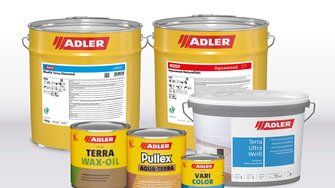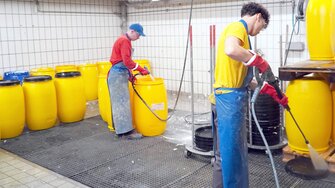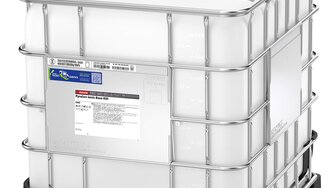Green light for sustainable packaging
ADLER takes sustainability a step further: the Tyrolean family-owned company relies on a resource-conserving circular economy not only for the production of paints and varnishes, but also for their packaging.
13 Aug 2025
No less than 2.7 million container sizes of paints, varnishes, stains & oils leave ADLER every year - and every one of them can be recycled. Recycling is very simple: "Empty containers can be handed in free of charge at any collection point for metal or plastic packaging as long as they no longer contain any liquid material," explains Helmut Stanzl, Recycling Management Officer at ADLER. Recycling not only reduces the mountains of waste, it also saves a lot of raw materials, energy and thus CO₂ emissions: each tonne of recycled tin cans produces around 1.7 tons less greenhouse gas, and emissions from plastic production can also be reduced by up to 87%.
A second life for packaging
The recyclate can then be used to produce new packaging. Half of all wall and façade paints from ADLER are already filled in buckets made of recycled plastic (and the trend is rising), and ADLER also offers selected products in practical, slim refill bags. Cardboard shipping packaging is also a true model pupil of the circular economy: it is usually made entirely of recycled material and can also be fully recycled. Often even directly at the ADLER plant: "We shred old cardboard boxes into filling material that we use instead of bubble wrap," reports Helmut Stanzl.
Reusable barrels and recycling IBCs
Deliveries to ADLER customers in the furniture, window and wood industries are usually filled into plastic drums. Once the paint has been processed, the empty drums are cleaned at ADLER and then refilled. Each year, this results in an impressive total of around 40,000 cleaned drums and containers - and therefore an equally impressive amount of waste saved. The same applies to the IBCs, large plastic tanks with a capacity of 600 to 1,000 liters. "At ADLER, we only purchase Green Layer IBCs from a German manufacturer, which are made of 35% recycled plastic," explains Helmut Stanzl. The empty containers are collected from the customer free of charge and then cleaned and recycled - saving around 100 kg of CO₂ per container.
Vision of the circular economy
"We have aligned our entire strategy with the principles of the circular economy - this applies to our products as well as to packaging and consumables," explains ADLER R&D Managing Director Dr. Albert Rössler. He still sees a lot of potential for the future - and the key to success in good partnerships across the entire value chain: "On the one hand, we are doing educational work with our customers, whether it's about processing environmentally and climate-friendly products or recycling packaging," says Dr. Rössler. "On the other hand, we are also in contact with our suppliers about new raw materials and packaging materials." Because the goal is clear: "Our vision is sustainable, recyclable paint production, from the processing of bio-based raw materials and recycled packaging through to seamless recycling!"
ADLER – paint runs through our veins
With 730 employees, ADLER is Austria's leading manufacturer of varnishes, paints and wood preservatives. Founded in 1934 by Johann Berghofer, this family business is now managed by a member of the third generation, Andrea Berghofer. Every year, 21,000 tonnes of paint leave the Schwaz plant and are delivered to customers in more than 30 countries worldwide. ADLER has sales subsidiaries in Germany, Italy, Poland, the Netherlands, Switzerland, the Czech Republic and Slovakia; their sole production site is the ADLER-Werk Lackfabrik in Schwaz, Tyrol (Austria). Innovation and sustainability are the cornerstones of the corporate strategy. ADLER is committed to active climate protection and is continuously working to improve the company's ecological footprint and develop sustainable solutions for its customers.
© by adler-lacke.com



